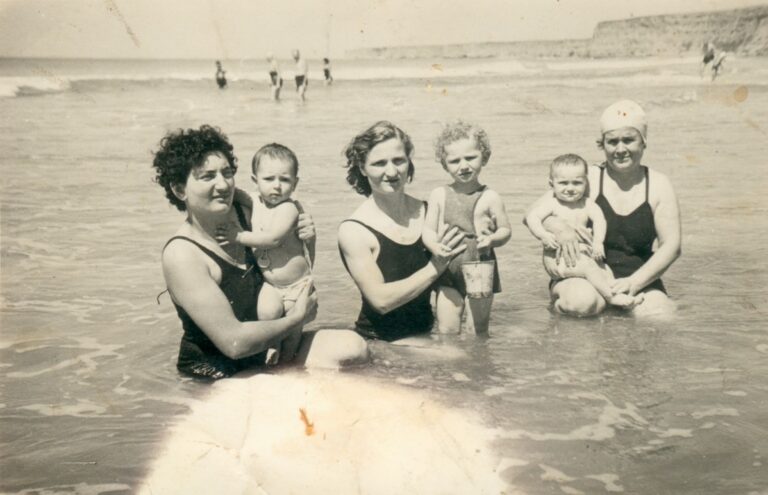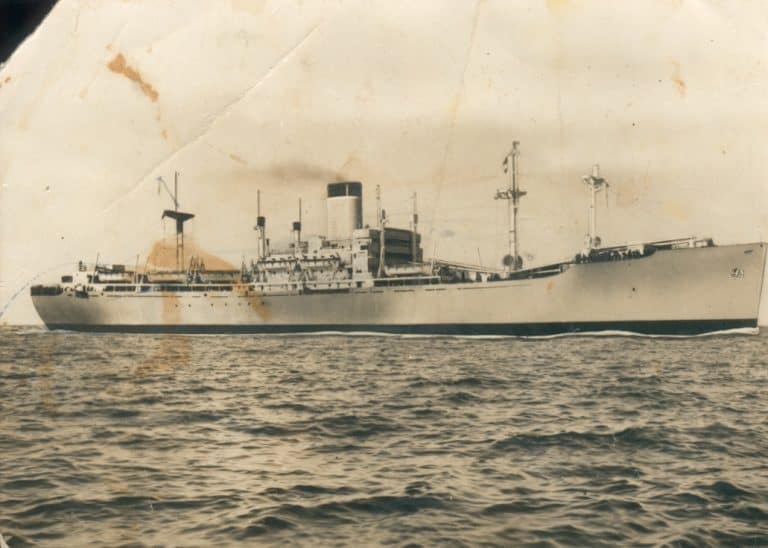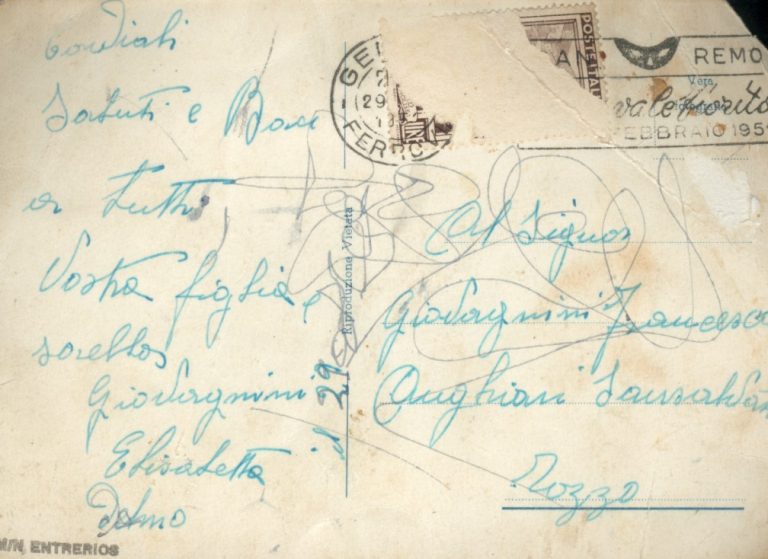ADELMO RUGGERI
This interview was very special. The person who was waiting for me very anxiously was my very dear grandfather. He was very joyful to be able to tell his story, but he had told her especially his wife-my very sweet grandmother-to leave us alone because according to him, "she doesn't let me talk."
After a good coffee, made by Bettina, sitting in her living room, the first question emerges ...
What is your first and last name?
My name is Adelmo Ruggeri. I was born in Anghiari.
When?
As long ago as I was born, on the 26th of February of 1926.
He is the second son of Oreste Ruggeri and Maria Laurenzi. His brothers: Alfiero, Alfredo and Don Arealdo Ruggeri; the latter lives in Ca' Raffaello, Arezzo.
Why did you come to Argentina?
I came to this land because in Italy as soon as the war had passed it seemed that there was another one; then there was no work. And Mr. Giovagnini -Paolo-, my wife's uncle, came, he made some propaganda, that here there was a bienestare , that here if was well, and then we got married in the year 1950, of September and of 51 we pressed the road that never ended to get here.
He married Elisabetta Giovagnini -Bettina- on September 16, 1950, in the Church of San Salvatore in Anghiari, Arezzo. That day they received the application to go to Argentina.
How many days did you spend in that ship?
With a scary-looking fishing boat, apparently it was a fishing boat. It took seventeen days. When I arrived in Buenos Aires a turbid water , with sheds all of branches that we got scared; it was me and Mezzovino . And that's how we got to this great Argentine land on February 17, 1951.
What profession did you have in Italy?
I was a farmer. I came here, my uncle had the company of radiators on plumbers and de to little we were half working with the uncle. I worked four years always in La Plata. Then, I mezzo to be a carpenter with my brother. I was a carpenter five years.
Where did you work?
Always here in La Plata. At that time there was work. I didn't like it much though, because the carpenter work comes in last on the house and when it' time to go and collect people always make you a story.
So, I went to my uncle's house on La Plata. He told me that he had three or four jobs there, de heaters, however, he didn't have people there to do these jobs.
Had you ever done these jobs for her?
Yes, I already knew how to defend myself to do the work. I told him, "I'll do the jobs for you but not by the day, this time I'll do them by contract." So, my uncle said yes, and the first job I did in Miramar, 400 kilometers away. Then, another 'job I did in the middle of the road, a little bit more, to go to Mar del Plata. Another job, I did it always with him, en Ameghino, 450 km de qua. Then, I did a job in Mercedes, 150 km de Buenos Aires. Finished this job I went to Mar del Plata two years. There I half 7000 meters de pipeline between hot water, cold water and radiators. I had 12 workers with me.
Were they all under your direction?
Yes, yes. I was in partnership with someone else, he was doing the technical part and I was doing the
work.
Where did you work in Mar del Plata?
On the submarine base , on the naval base that is in Mar del Plata. Yes and worked two years. Then, I worked another four months in a Navy hotel, also in Mar del Plata.
After that job, Uncle there was doing so well, he then did a job on a prison in Sierra Chica, pero I worked there very little, three months.
Always with radiators?
Yes, but after that I came to La Plata and worked. I was given the job by Uncle Gosto with Rusconi. We worked together, first with Uncle -Paolo Giovagnini- , then they split up and the two of them -Rusconi and Constantino- set up a company and I did different jobs, here on La Plata and in Buenos Aires. And after '65 the same company was made between all four of us: me, Uncle Nello , Uncle Gostino and Rusconi -Edgardo-.
Was Rusconi of Italian descent?
Yes Italian, however, he was Argentine. And so, we had to keep an Argentine because until to take government jobs you needed Argentine citizenship, whereas with him, I never did Argentine citizenship. If it's worked together, here in La Plata, four or five years.
After working here, four or five years, we came up with jobs out of here.
The first job I did on the "Valle de Rio Negro" in General Roca. I went with a truck and a rulote (as they say in Italian) that when I left La Plata I didn't know whether to follow or go back, I couldn't put it in fourth speed, and so by dint of taking courage I followed, and I left in the morning here at eight o'clock, and at nine o'clock at night I arrived in Bahia Blanca, 700 kilometers from here. The night was slept on the rulote, in the morning at five we left and it was by road 22, national, which goes from Bahia Blanca to Rio Negro, or be it, to the Valle de Rio Negro, to Neuquén. When I arrived at the Rio Colorado, which I passed the bridge and took a road, which was 130 kilometers without a curve, and I with a speed with that house de 30 km. Of the morning that we left de Bahia so arrived in General Roca at 6 in the evening. We arrived, we settled in for work, and I was there 4 or 5 months.
And what work did you do?
I was doing a job that here is called "radiant losa" because they are pipes that go inside of the same ormigon . And I was going 700 meters of ¾ pipes, going every 30 centimeters, 700 meters for each floor. I did four floors. I finished the job with the boiler, everything.
Later, in La Plata, we e at a job en Esquel, 1200 km. from here. So I went with three workers, to put forward the work that other firms went and they were not able to do the work. So I went there, with three workers, after that I booked three others, who came by plane, and so I was there sixty days. The one there was also to do the hot water for the baths, because the people who were working on the resumption , it was in the winter, and they couldn't bathe with cold water. The 'other one was for radiators, for heaters. They will be shacks by the way de wood for the workers. Because they did a resumption and then there were, I think it was 1700 workers. These shacks was a system de pabellon (como se dice qui) that housed 400 workers, each apartment. So I was there 3 months, then another time I went there 3 months, 3 years; but always in winter. I always liked it because I was used since I was little to being in the cold, it didn't scare me.
After 3 years that I worked there, following that, I at 'another job in Sierra Grande, "Hierro Patagónico," and I stayed there 4 months as well. Just on the sea coast, because they were doing a shipyard, to transport the iron they were quarrying from the Sierra Grande minery. It was cold there, though! I was there one 'winter with a cold, windy, that I always remember! And so it was 2 or 3 years of that work. Del 75 when grandma came here....
Your mom
Yes, it was 6 months, I went to do a job in Rio Turbio, at the coal mines. To get there, it took me two days because I didn't know the way. In two days I did 3200 km. I was always making heaters on these shacks for the workers.
Were all these jobs for private individuals or for the public, for the government?
No, these were private people, no it was governmental; same with Esquel. Son
companies of private people, no it is governmental.
After, finished there, of the year 77, I went to do another shoot en Alicura, 100 km from Bariloche. And even there I worked 4 or 5 months.
I finished that job and I went to work a par de months with Uncle Gaetano . I went to do a job in Alumine, always for those mountains; and so it was 10 or 15 years always for those mountains. Then we came back here, and it was continued to work in La Plata.
Did you work in La Plata?
In La Plata I always worked, especially on work, before the year 90, if he did work para the government, of the bidding, if he took work directly with the government. Pero later came Mr. Governor of the province changed the system and there was no more architecture, where we used to do bidding to take jobs. They got together and gave the work to whoever they wanted. And then instead of doing well, as we were doing up to that time, we started to go backwards. Porque we could not do the skills with other companies. Then we lost two jobs because there was so much inflation (do they say that?).
Where.
In La Plata I worked at the Camara de Senators, de Deputies, at the Hospital
Polyclinic, at Hospital Gutierrez, in the Obras Sanitarias building.
I worked on the opedal da Haedo, worked in two hospitals in Belgrano, 120 kilometers from La Plata. Then I worked on the opedal in Bolivar, 250 kilometers away, on the Industrial School of Bolivar. Then I worked here for different cities in Argentina's noroeste: Nueve de Julio, Chivilcoy, Pehuajo, Carlos Casares, all the government ministries.
What do you think was the most dificult job you had to do?
Nostro work are pretty much all the same. There is a little bit of dificile when you
you have to put boilers, when the jobs are big. Here, on La Plata, in IOMA , I put 4 boilers that are very big, and it was dangerous to put in place. On the Chamber of Deputies the same. A little danger because if not, the other jobs, they are not. Because for us we always use the same irons, the same intubations.
First you had a company between you, Rusconi and the two Giovagnini brothers, after that you only got together with...
They, they secluded themselves because Uncle Nello died, which was 76, 77. Uncle Gostino and wanted to go to work with his brother, with Uncle Gaetano, because here we came with little work and it's those times that always a company misses them something. So Uncle Gaetano offered him double the pay that he was getting on the firm with us. He went to Neuquén, with Uncle Gaetano and I stayed with Rusconi.
The first years we did very well with Rusconi, the year 80, 82. Yes and at different jobs, one here in La Plata, big one, the Colegio de Avvocati, even there they had 11 floors. I did a job that the construction engineer was delighted because I did the job quick and well. That was also a type of "losa," as they call it here, "radiant," it was all the intubation for the floor. It went very well. Then, you presso with this Rusconi, work in Bolivar, work in Nueve de Julio, en Carlos Casares, en Pehuajo, we bought a new trucketa; it went very well. After that and changed.
What were your dificulties encountered?
I cio had no difficulty, because always the guide was uncle. So he gave us a house with everything. I was a laborer and there was a mason, and he made a house two squares or 200 meters de where we are now. I the truth that for those things I didn't have to worry because I worked and at the end of the month he paid me. The house I paid no rent, we were three years. We bought a piece of land, in the middle, with my brother Alfredo and made the house together, and that's the way life goes.
What about with the tongue?
And with the tongue at the beginning some preocupation there is; however, as here there is
so many Italians then there was not so much preocupation, and then it is not so, so dificult the Argentine or el castellano.
With the Argentines, how did you get along?
I have never had any inconvenience with Argentines because when you inmigrate you don't have to have a pride, you know you are in other people's homes. On the contrary, you have to respect people, then if you respect you are respected. I never had problems, none of us, not even Uncle Gostino, Uncle Nello. We never had any problems. Not even with the workers. I always had Argentines with me, but I never got respect out of them.
Do you have children born in Argentina?
In Argentina I have two: Ms. María Catalina and Gian Carlo Ruggeri.
And what is their relationship with Italy? Do they know the language, the stories...
The daughter, I'm happy because I every time I went to Italy, I didn't do so much propaganda as it was: my country is the best in the world; why then if you were so well, did you come here?
However, when her granddaughter came to complire fifteen years, they went to Italy with my little daughter and when she came back she made me so pleased because she was delighted de see about the places where one was born, which I had never given her importance; whereas when she came and stayed, and I was so pleased. While the son still did not go.
And have you returned to Italy many times?
And many times not. I went back to Italy four times. And now I want to go one 'more time though hopefully.
And when was the first time you went back to Italy?
The first time I went back to Italy it was 14 years I was here. I went from 66. Then I went from 80 and then from 86 and then from 92. And now you can, after 12 years plus .
What was the one that impressed you the most when you first came back to Italy?
When one returns to Italy one feels it, however what do you want to do. That's why I've done them so, so much things to take their children away from here; because you have to know that to be inmigrated one always suffers, because the place where one is born no matter how ugly it is always beautiful.
I can't complain about Argentina because thank God I made the house for the two little sons, I made the house for myself. I made sheds, hardware for my work, which I still have. What I'm complaining about this Argentina, that after working 50 years to this land, now that one should have a pension, that one could be fine without doing anything, and while now you see it a little bit strong to maintain this little bit of capital that we have left. You get busy to be able to pay for things, to be able to pay all the taxes. It shouldn't be like that because when one has worked all his life he should already be fine whereas here the policy has always gone backwards.



